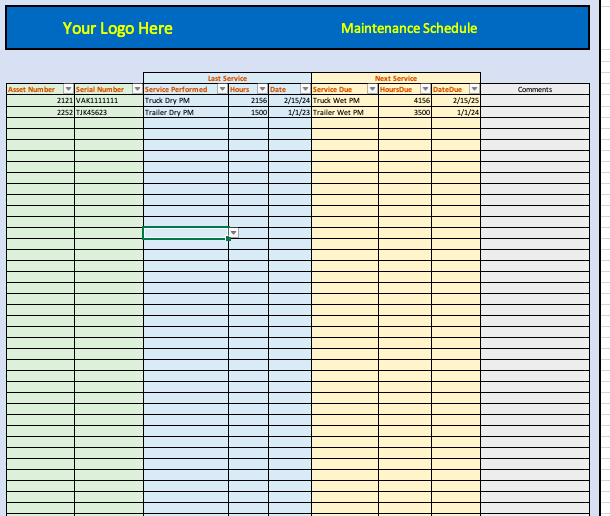We all know the importance of maintenance in extending the longevity and cost of ownership for our equipment. But what about maintenance for refrigerated trucks and trailers? Below we will discuss a few tips and tricks that will help keep your refrigerated fleet operating in top condition.
Preventative Fleet Maintenance Service
Refrigerated units are complex mechanical systems. Each refrigeration unit consists of a refrigeration system, a mechanical system, and an electrical system, all designed to operate together to cool or heat a box. Many people are familiar with maintaining the mechanical system of your refrigeration unit due to its similarity with a combustion engine, however, there are several additional things that a fleet manager needs to be aware of when maintaining reefer units.
What Sets a Refrigeration System Apart?
Most truck or trailer refrigeration systems include a diesel engine that spins a compressor. This compressor pushes refrigeration through a series of lines, valves, and heat exchangers that transfer heat from one side of the unit to the other. Any part of this refrigeration system can cause trouble if not maintained properly. Below, we hit on several reefer-specific tasks every refrigerated fleet manager should be aware of to ensure their reefer fleet stays operating at peak efficiency.
Inspecting Your Refrigeration System
Cleaning the Condenser and Evaporator Assemblies
Any time you service a refrigeration system, clean the condenser and evaporator assemblies. These assemblies are designed to transfer heat, and if they are dirty or blocked, the unit will not operate as designed. With an inefficient heat transfer due to dirty or blocked assemblies, the unit may use more fuel or not cool as quickly. In the worst-case scenario, the unit may shut down for high head pressure or cause premature wear to the compressor and other components.
The condenser is located at the front/top of the unit. Check to see if the fins are damaged. You can purchase a tool that helps straighten out the fins if needed.
Clean the condenser with a low pressure water spray. Condenser cleaner can also be used but be sure to use these products in accordance with the labeling since these products can be acidic.
When inspecting the evaporator, remove the bulkhead from inside the trailer. Many times, shipping plastic wrap can be pulled into the evaporator, partially blocking the airflow.
Compressor Leaks
It’s also a good idea to check the compressor for any leaks. If any oil is spotted near the compressor shaft, this could be an indication that the shaft seal is beginning to leak. If the seal isn’t replaced, the unit could lose refrigeration and cause the unit to shut down.
Drain System Kazoos
Another quick inspection is to check the drain system kazoos. These are the black drain tubes extending from the bottom of the refrigeration unit. These tubes drain water out of the evaporator during a defrost cycle. If these tubes become obstructed, water may not drain properly out the unit and create issues such as icing up the evaporator.
Battery Connections
Any time you have the unit in for service, don’t forget to check the battery connections. Newer Carrier refrigeration units run off a can-bus system that consistently checks for abnormal system operations. Low voltage can cause the unit to fail a check and set the unit to alarm or shut down. Keeping your battery connections clean minimizes the chance that a false electrical issue causes the unit to alarm.
Tips for Proper Fleet Maintenance of Refrigerated Trucks and Trailers
- Many customers find that their maintenance intervals fall close to a yearly schedule. It may be beneficial to schedule your reefer maintenance during your annual DOT inspection.
- Filter kits are an easy way to make sure you have everything on hand when you go to service your unit. Filter Kits are available for most Truck, Trailer, and APU systems. It doesn’t hurt to have an extra on hand.
- Along with the filter kit, it may help to have an extra set of belts on hand. This may save you from an after-hours service call if you ever lose a belt.
- Don’t forget about your battery! We recommend replacing a standard wet cell battery at least every 3 years.
- If your units sit for any extended periods, you may consider a solar panel to keep your battery topped off.
- Teach your drivers to properly do a pre-trip on the refrigeration unit. Preventative maintenance includes a daily inspection to catch issues before they happen.
- Don’t forget to wash down the reefer unit. Salt spray and road grime can wreak havoc on unit frames. Also, be careful with battery acid spillage near the battery compartment.
- Lubricate your door latches. This will prevent having a stuck door in a few years.
Finally, if you are looking for and all in one guide with Carrier maintenance inspection logs and a simple spreadsheet to track your asset maintenance, see below.
Finding a Fleet Maintenance Contract Provider for Refrigerated Trucks
We understand how irritating it can be to not get the insight and support you need to choose the right equipment and make the right repairs. And that’s why for over 30 years, our customer service reps and certified master technicians have helped fleet managers, owner-operators and transport business owners keep their vehicles in tip-top shape with the best equipment and timely service and repairs.
Looking for an all-in-one maintenance and repair guide? Download our tracking sheet with Carrier maintenance inspection logs and a simple spreadsheet to track your asset maintenance.
Reduce Repair Costs by Tracking Fleet Maintenance
Need an efficient way to keep track of maintenance on your units and trucks? Download our easy-to-use Maintenance Tracking Tool, complete with maintenance intervals for easy reference and preventative maintenance inspection forms for:
- Trailer Refrigeration Equipment
- Carrier Transicold’s Supra Series
- ComfortPro APU Models

